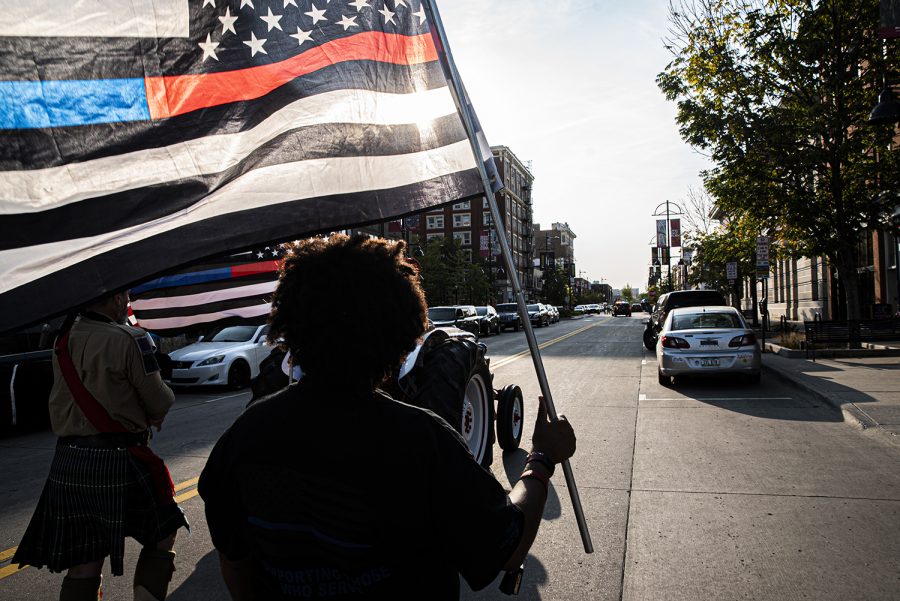Opinion | ‘Back the Blue’ is an astroturfed façade of support
The recent Back the Blue rally is a slap in the face to victims of police brutality and shows a willful ignorance of the problems faced by people of color in America.
A woman of color marches through downtown Iowa City as part of the the Back the Blue protest on Friday, September 25th, 2020. Citizens marched through downtown Iowa City to show solidarity with the local police force and as a counter protest the Black Lives Matter activity that took place over the past few months.
September 29, 2020
Iowa City, how dare you?
How could you in good conscience decide to host a rally for police support the same night where a memorial for a victim who is experiencing systemic racism took place?
Furthermore, how could you be advocating for an increase in law enforcement funds for a system that has evidently portrayed systemic racism?
The ‘“Back the Blue” march was completely moronic because of the ignorance to recognize systemic racism, their feeble arguments to increase funding, and the disrespect toward those mourning true injustice.
First, blue lives don’t exist. Police officers choose their profession and get to take their uniforms off when they get home. Black lives don’t get to choose the color of their skin. They don’t get a chance to escape the racism and oppression that has been rooted in American soil.
Second, how can an advocate for Blexit — a Black exit from progressive movements — Arielle Chambers claim that this is not a race problem but a culture problem when data proves otherwise? The facts clearly depict racial disparity. Black Iowans were 11 times more likely to be incarcerated than white people in our state. Black male offenders were sentenced 20 percent longer jail time than white offenders in similar situations.
There is nothing subjective about these statistics, and the rally just decided to blatantly ignore this reality, only demonstrating the evident systemic racism in American society.
Advocating for an increase in police funding is harmful because it acts as a catalyst for systemic racism since police are part of the problem.
The second argument made by Chambers for this rally was that young people need to respect authority and stand for the people who “risk their lives.” However, this is completely contradictory because the people who supposedly protect us are the ones who have tear gassed peaceful protesters and are currently under investigation for their harmful actions.
It doesn’t make sense that protesters are seen as disrespecting authority when fighting for equality and justice, yet police don’t have to respect their first amendment rights to peacefully protest.
Finally — to put it very bluntly — it was an insensitive and cold decision to march the same night the Iowa City community gathered to mourn the loss of Makeda Scott.
The injustice that Scott and her family are experiencing is a result of systemic racism in law enforcement due to the lack of answers, urgency, and contradicting statements and stories the police have made about her death. The Sheriff’s Office has said it has given Scott’s case the same urgency it does to other crimes.
Some people forget that Makeda wasn’t just a Black woman; she was a human being who at least deserved the respect and opportunity for her life to be honored. The fact that Turning Point USA had the audacity to “back the blue” the same night where they knew the memorial was for someone who is a victim of systemic racism was inhumane.
How could you be so cruel to a mother grieving the loss of her child? I personally wouldn’t be able to sleep at night knowing that I marched to support police at the same time as a memorial.
Having these types of rallies while ignoring the roots of systemic racism in the police force is only going to lead to the loss of more lives because of injustice and inequality. Iowa City, we need to do better.
Columns reflect the opinions of the authors and are not necessarily those of the Editorial Board, The Daily Iowan, or other organizations in which the author may be involved.



